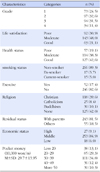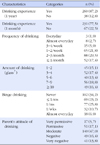Abstract
Purpose
The purpose of this study was to identify the factors influencing the alcohol drinking behavior in female university students.
Methods
The subjects were 298 female university students at three universities in J Province and G city. Data were collected using a structured questionnaire and analyzed by SPSS/PC+ 15.0.
Results
The variables that affected the drinking behavior of female university students were smoking status, pocket money, coping strategy of problem solving, positive expectancy of alcohol drinking and negative expectancy of alcohol drinking. These factors could explain 30.4% of the drinking behavior. Stress did not affect the drinking behavior of subjects.
Figures and Tables
References
1. Amirkhan JH. A factor analytically derived measure of coping: The coping strategy indicator. Journal of Personality and Social Psychology. 1990. 59:1066–1074.
2. Borsari B, Carey KB. Peer influences on college drinking: A review of the research. Journal of Substance Abuse. 2001. 13:391–424.
3. Boyd MR, Baliko B, Cox MF, Tavakoli A. Stress, coping and alcohol expectancies in rural African-American women. Archives of Psychiatric Nursing. 2007. 21(2):70–79.
4. Carver CS, Scheier MF, Weintraub JK. Assessing coping strategies: A theoretically based approach. J Pers Soc Psychol. 1989. 56(2):267–283.
5. Chon KK, Kim KH, Yi JS. Development of the revised life stress scale for college students. Korean Journal of Health Psychology. 2000. 5(2):316–335.
6. Choo SY, Lim SM. The relationship between life stress and depression in undergraduates: The mediating effect of experiential avoidance and the moderating effect of problem-focused coping. Korean Journal of Youth Studies. 2010. 17(2):309–332.
7. Do EY. The effect of the drinking-reduction program adopting transtheoretical and leisure models on problem drinking behavior and cognition. Journal of Korean Academy of Community Health Nursing. 2007. 18(3):363–372.

8. Greeley J, Oei T. Leonard KE, Blane HT, editors. Alcohol and tension reduction. Psycological theories of drinking and alcoholism. 1999. New York, NY: Guilford Press;14–53.

9. Ham LS, Hope DA. College students and problematic drinking: A review of the literature. Clinical Psychology Review. 2003. 23:719–759.
10. Han KS, Yang SH, Chon KK. Effects of perceived stress and ways of coping on symptoms of stress and drinking related problems among female college students. Korean Journal of Health Psychology. 2003. 8(3):567–579.
11. Hasking P, Lyvers M, Carlopio C. The relationship between coping strategies, alcohol expectancies, drinking motives and drinking behaviour. Addictive Behaviors. 2011. 36:479–487.
12. Jung BY. Relations of stress with drinking behavior and drinking-related problems. 2009. Incheon: Inha University;Unpublished master's thesis.
13. Kim HK, Choi ES, Ann JS. Factors influencing alcohol consuming behavior of the female university students. Korean J Child Health Nurs. 2004. 10(2):205–216.
14. Kim KH, Kim JI, Kim JS, Jeon HS. Correlation study on physiological stress from drinking, alcohol abstinence self-efficacy and outcome expectancy in youths. J Korean Acad Fundam Nurs. 2009. 16(1):73–82.
15. Kim SD. The effect of alcohol outcome expectancy on drinking: Comparison between expectancy theory and expectancy-value theory. 2000. Seoul: Seoul National University;Unpublished master's thesis.
16. Kim YS. The relationship between coping motives for drinking and drinking behavior among college students. Ment Health Soc Work. 2001. 9:5–23.
17. Kuntsche E, Knibbe R, Gmel G, Engels R. Why do young people drink? A review of drinking motives. Clinical Psychology Review. 2005. 25:841–861.
18. Lee HJ, Cho SH. The effect of self-compassion and perceived controllability of stress on coping strategies. Journal of Student Guidance and Counseling. 2011. 29:5–33.
19. Lee KY, Lee SI. A study on psychosocial factors affecting alcohol drinking behavior of new college students. Korean J Psychopathol. 2000. 9(2):157–167.
20. Ministry of Health & Welfare. 2010 Korea national health and nutrition examination survey. 2011. Seoul: Author.
21. Mun YH. Factors influencing drinking problems in female university students. Journal of Korean Academy of Community Health Nursing. 2007. 18(4):552–561.
22. Park JM, Rhee MK. Effects of perceived stress, social support and drinking motives on drinking behaviors among college students. Korean Journal of Health Psychology. 2005. 10(3):277–293.
23. Park JS. A study on factors affecting problem drinking of university students. Korean Public Health Research. 2000. 26(4):393–413.
24. Shin HJ. A validation study of coping strategy indicator (CSI) in Korean university students. 2002. Seoul: Seoul National University;Unpublished master's thesis.




 PDF
PDF ePub
ePub Citation
Citation Print
Print






 XML Download
XML Download